A Tenant Recommendation Letter is a specific document that allows landlords to express a degree of confidence in a tenant.
In other words, when individual tenants seek housing in a different property, the former landlord may write a letter of goodwill that will serve as a reference to the new landlord. This can be especially helpful for aspiring tenants with a low credit score, but a responsible rental history.
In general, these letters confirm that a tenant is a dependable individual who sticks to the rules of the rental agreement. That’s why the author of the letter should include information relevant to a housing agreement, such as details about their stay.
Customizable Templates
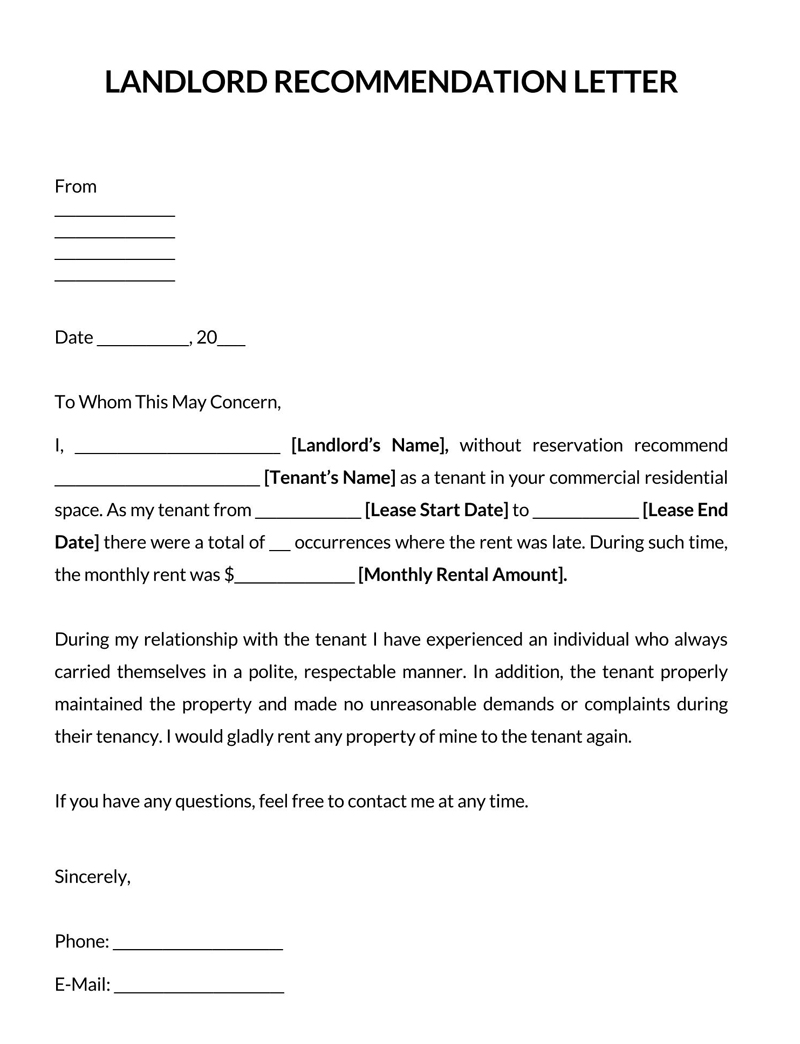
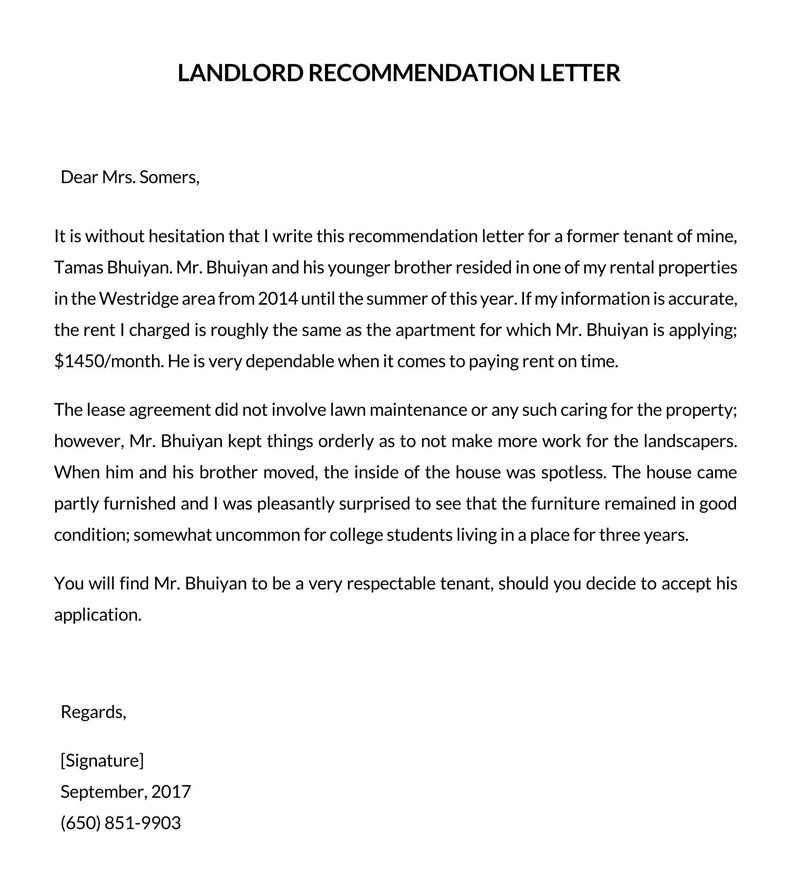
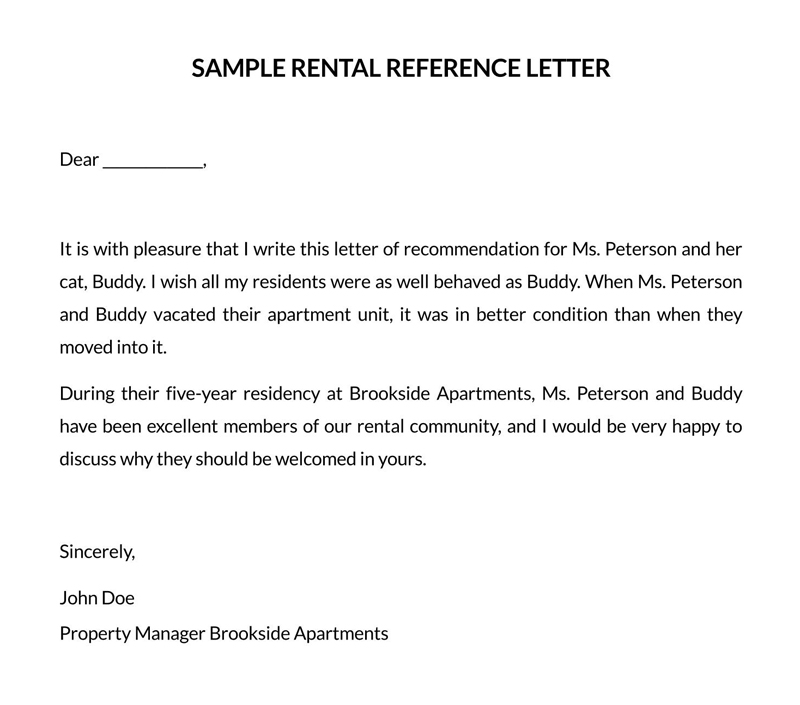
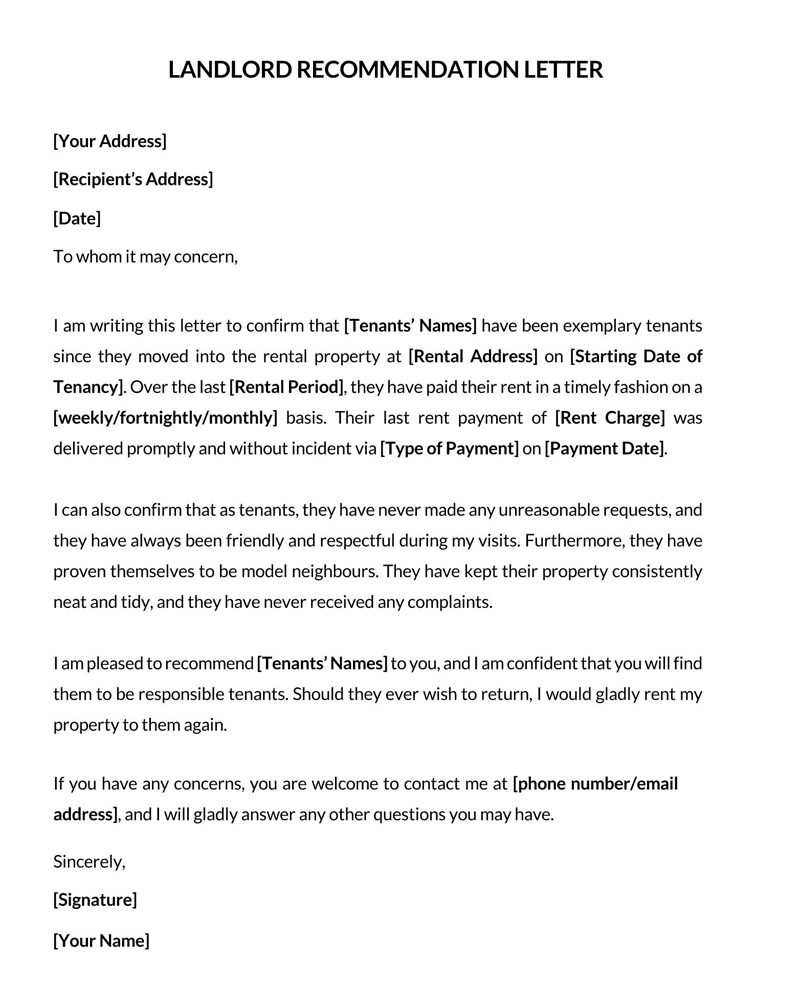
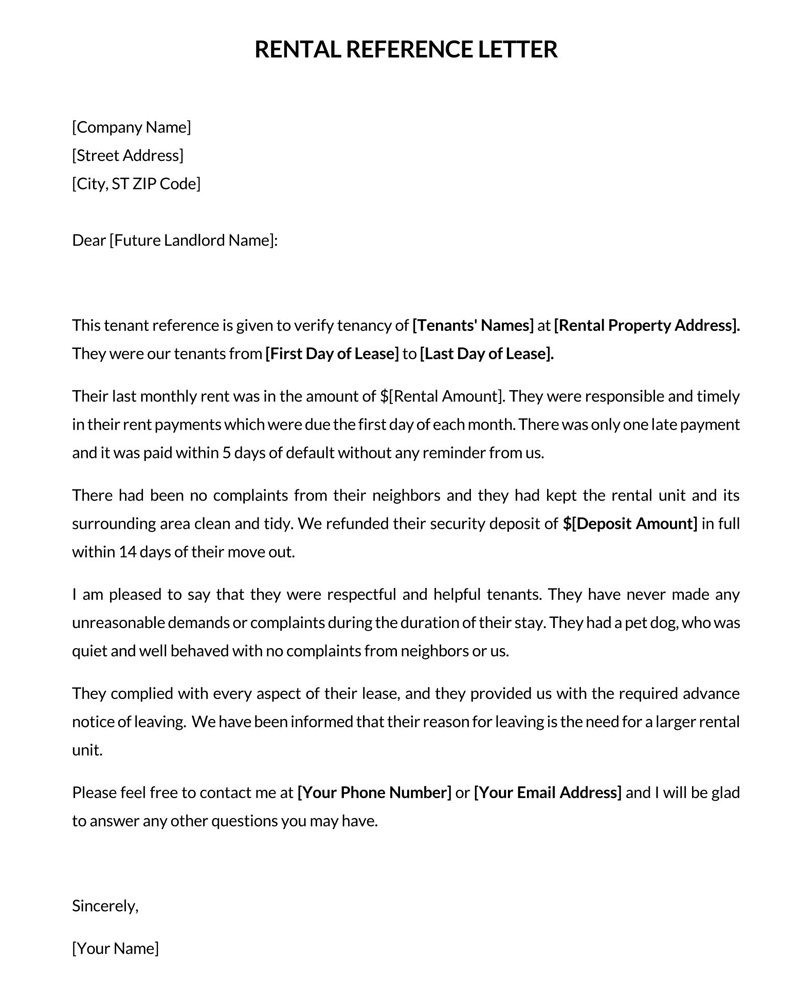
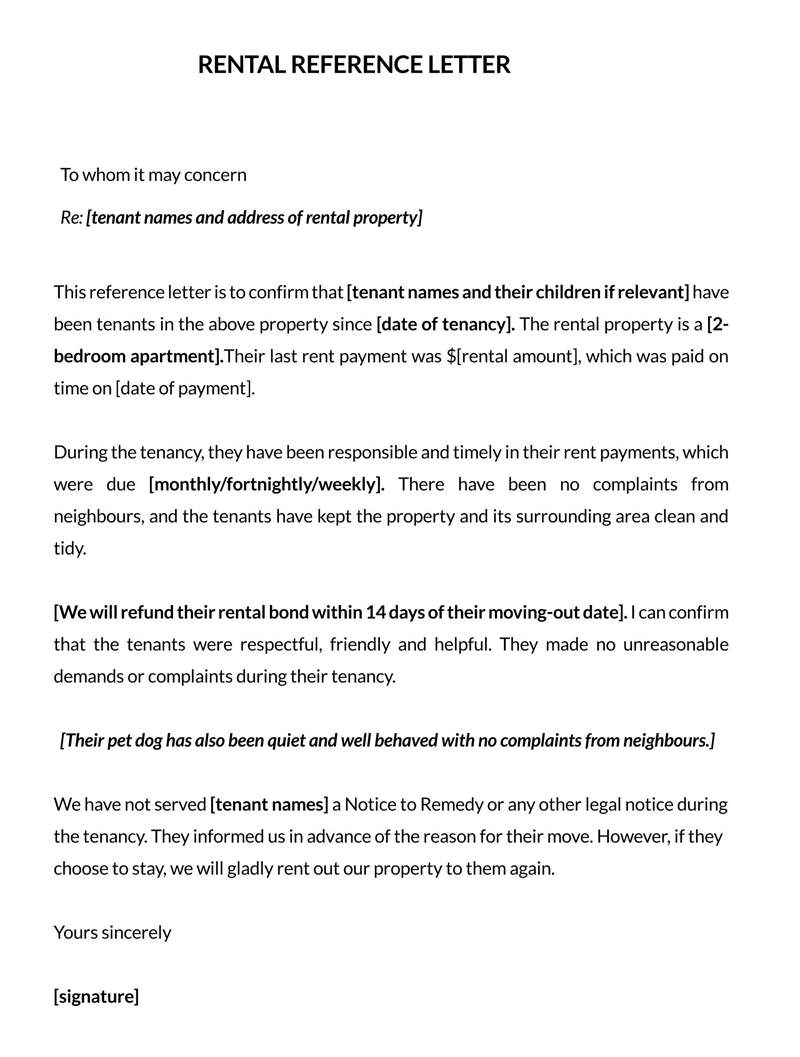
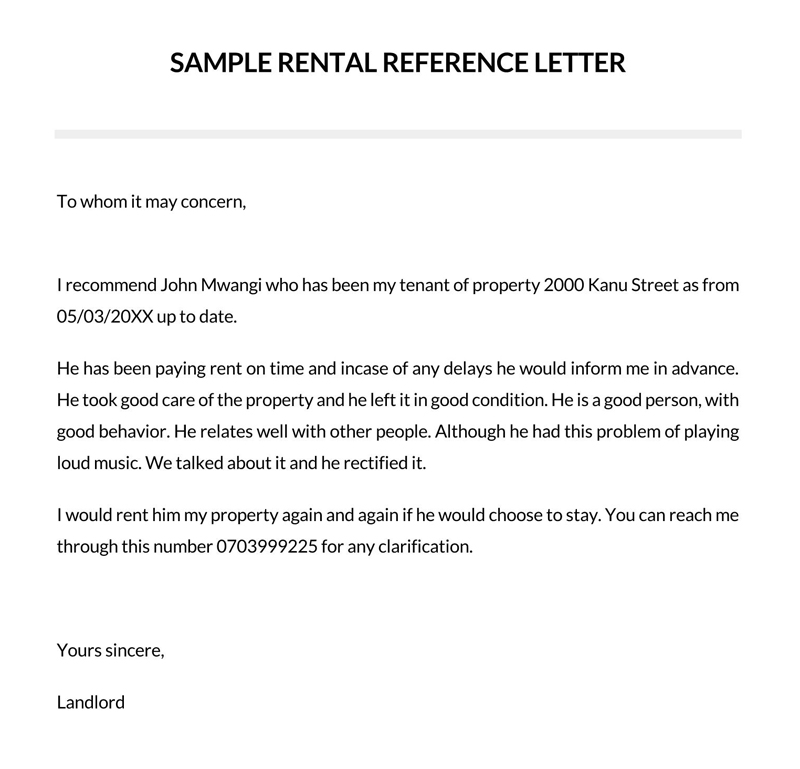
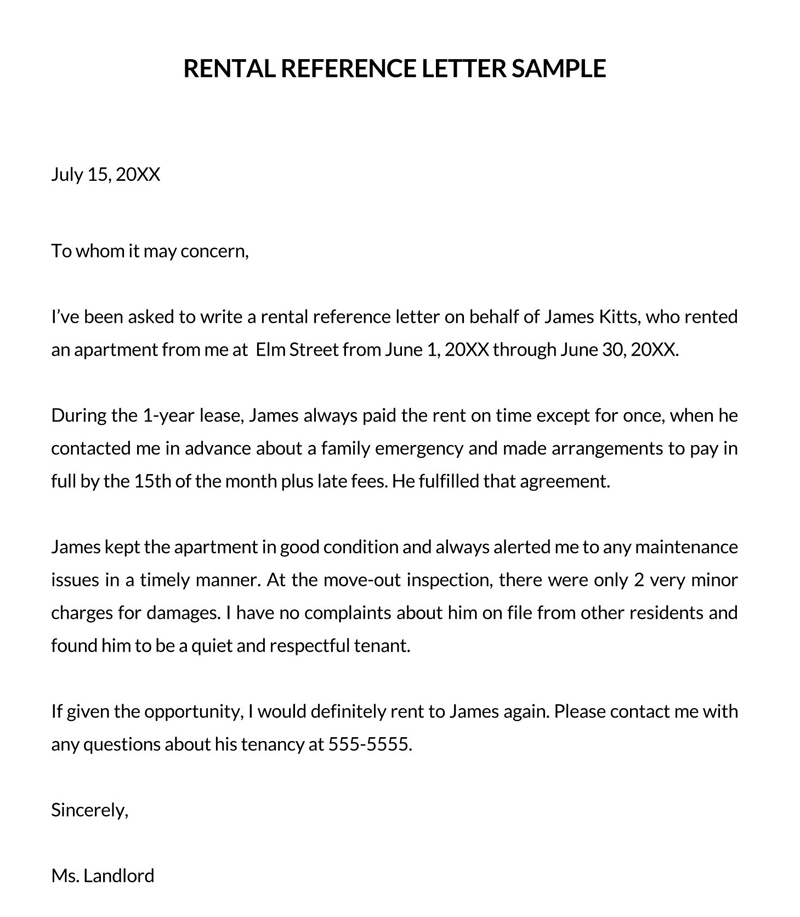
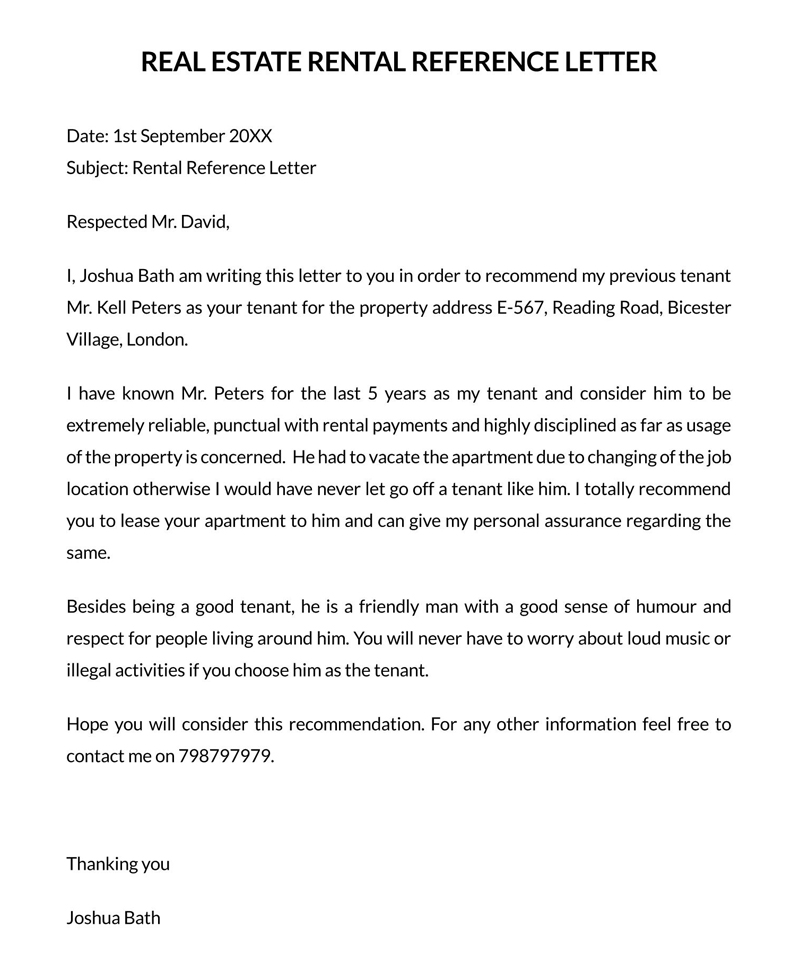
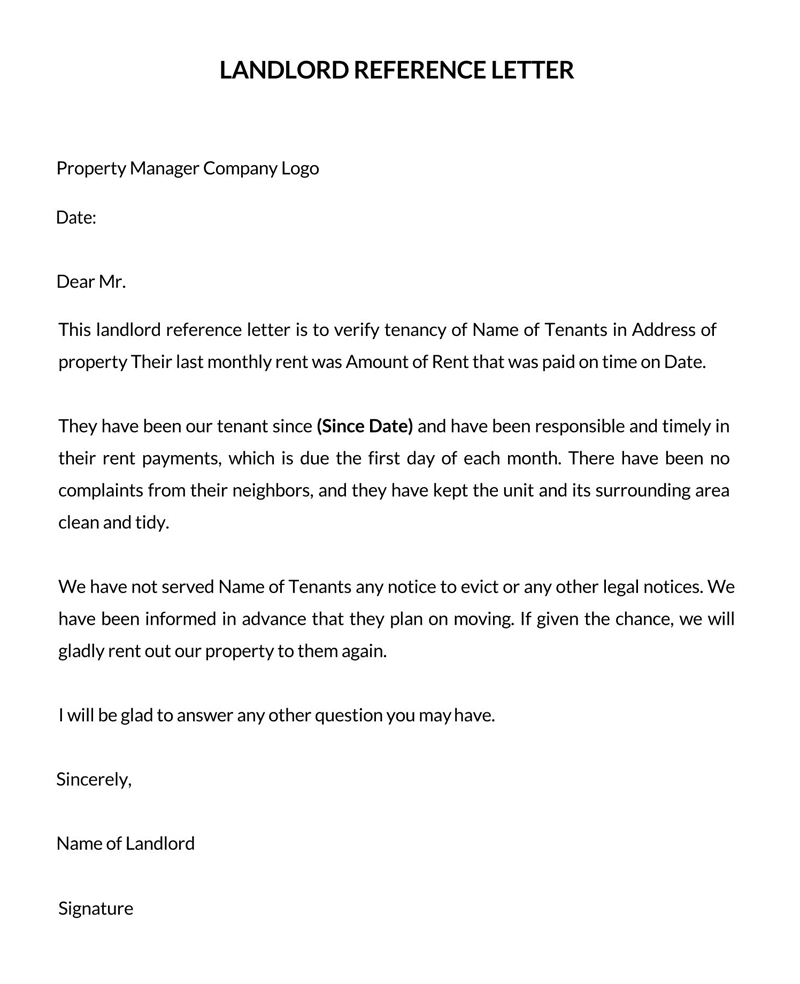
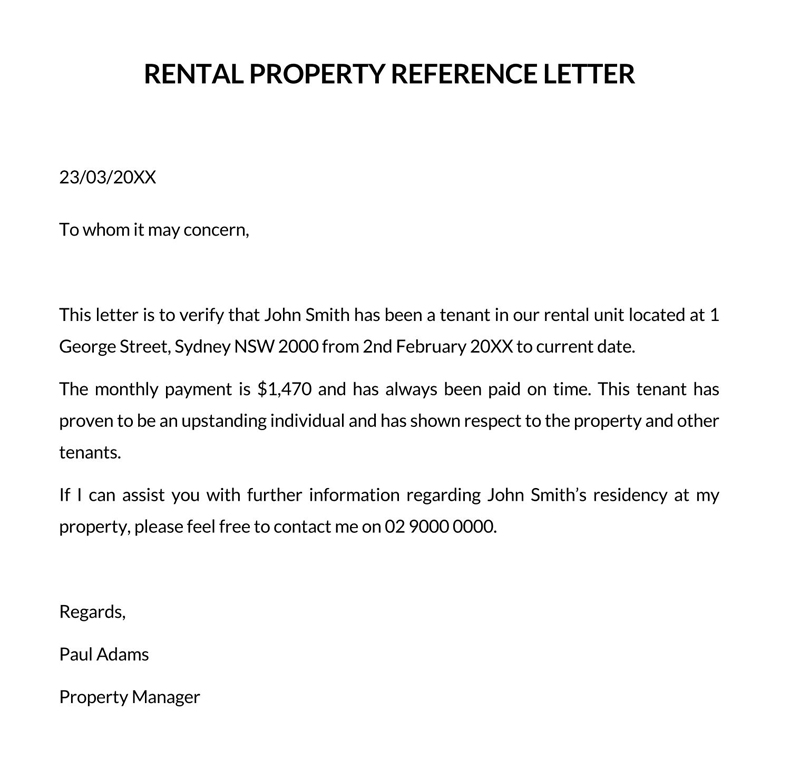
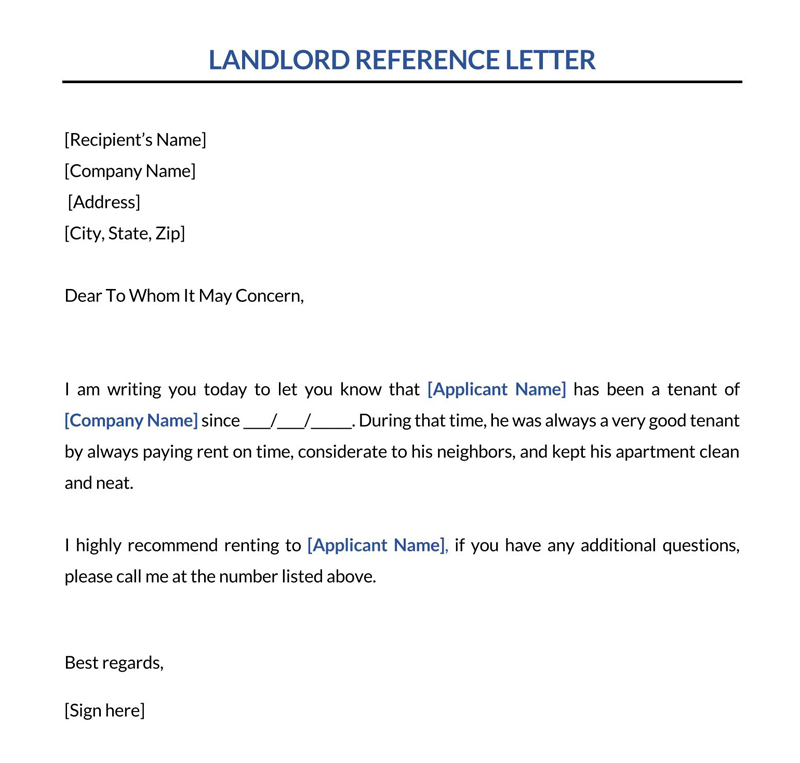
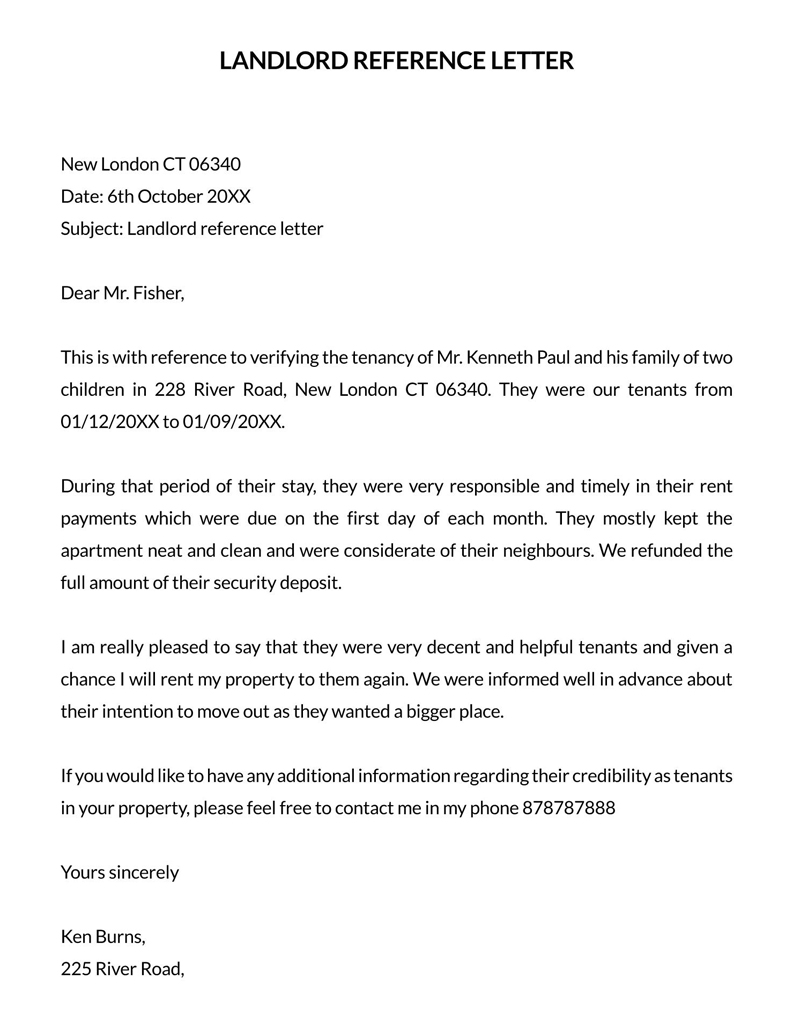
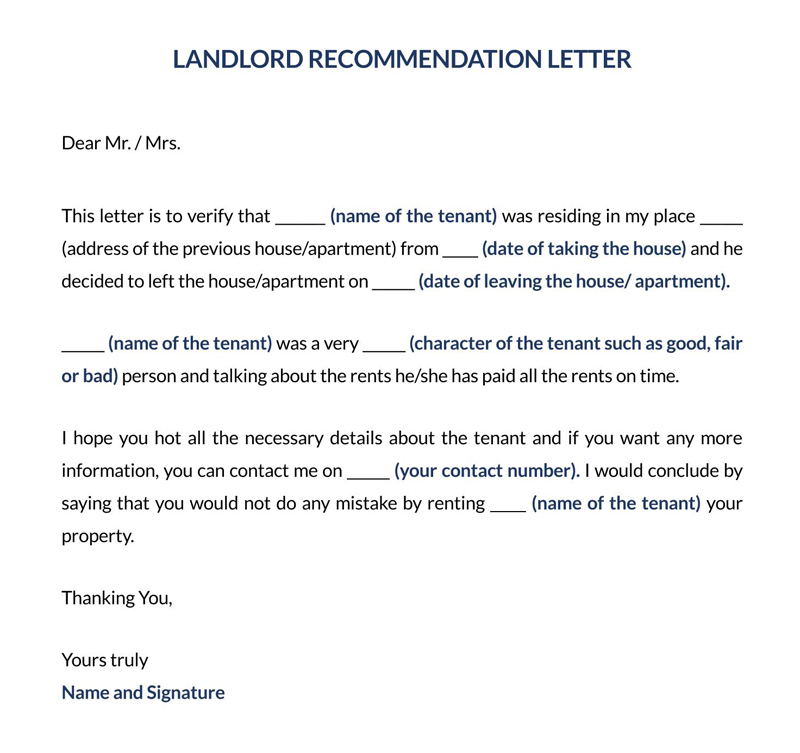
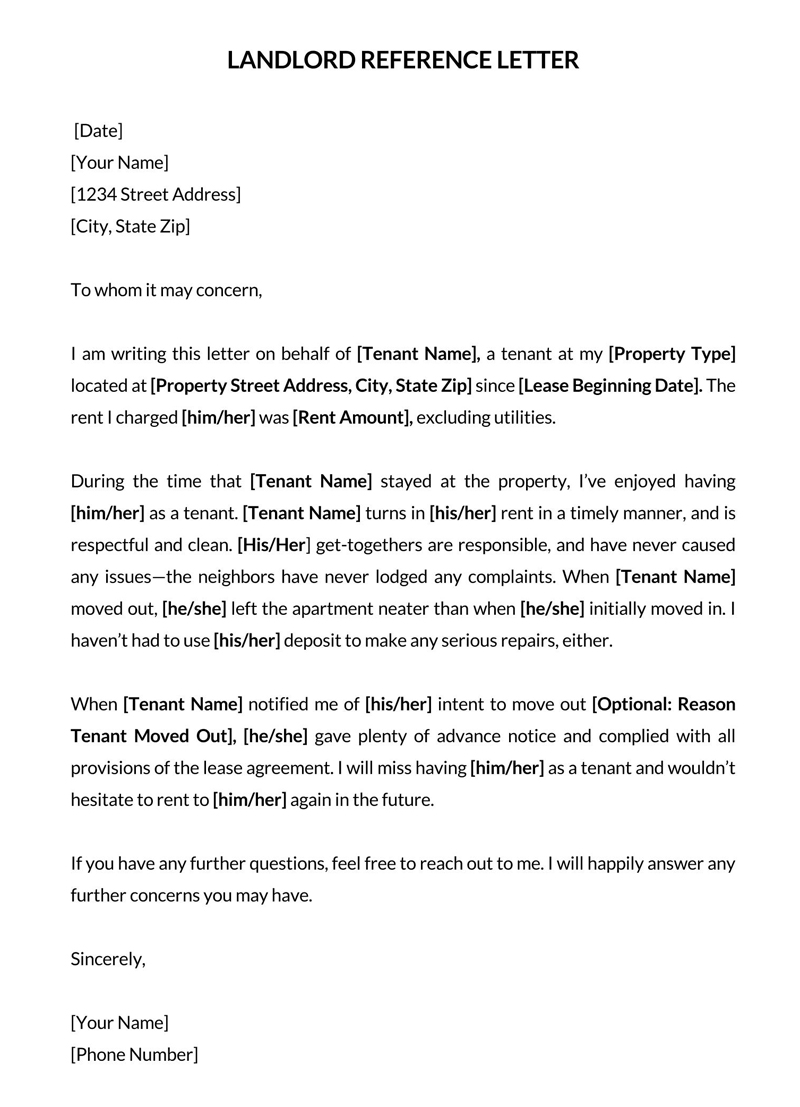
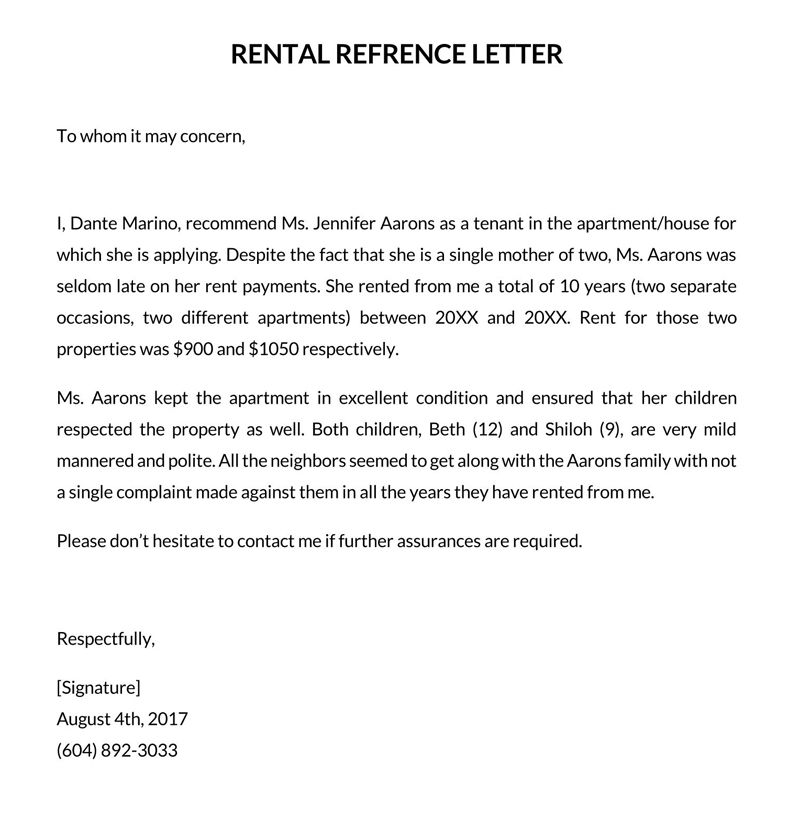
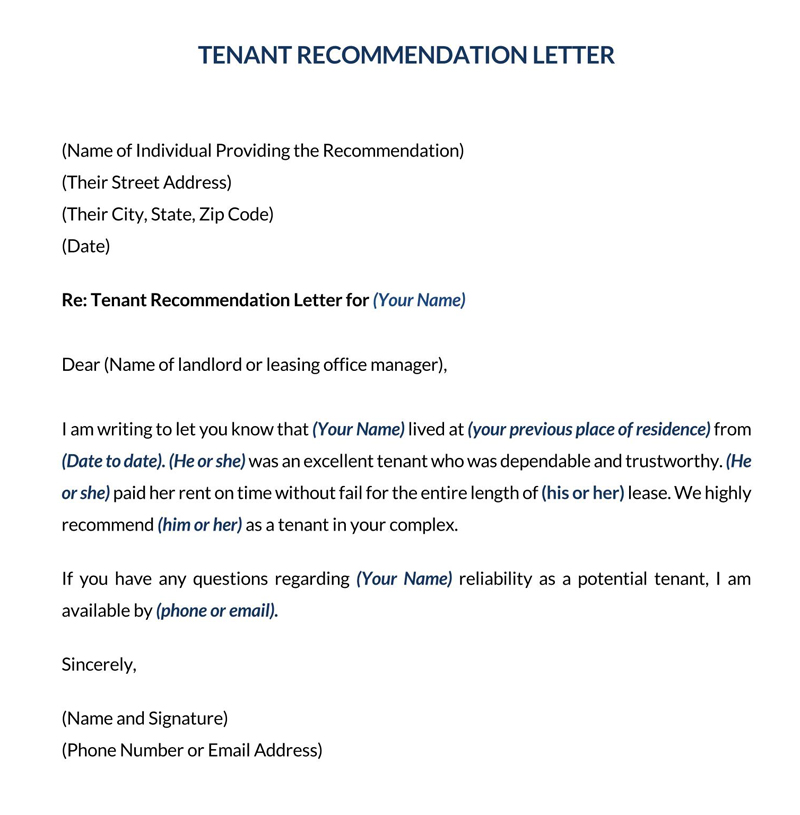
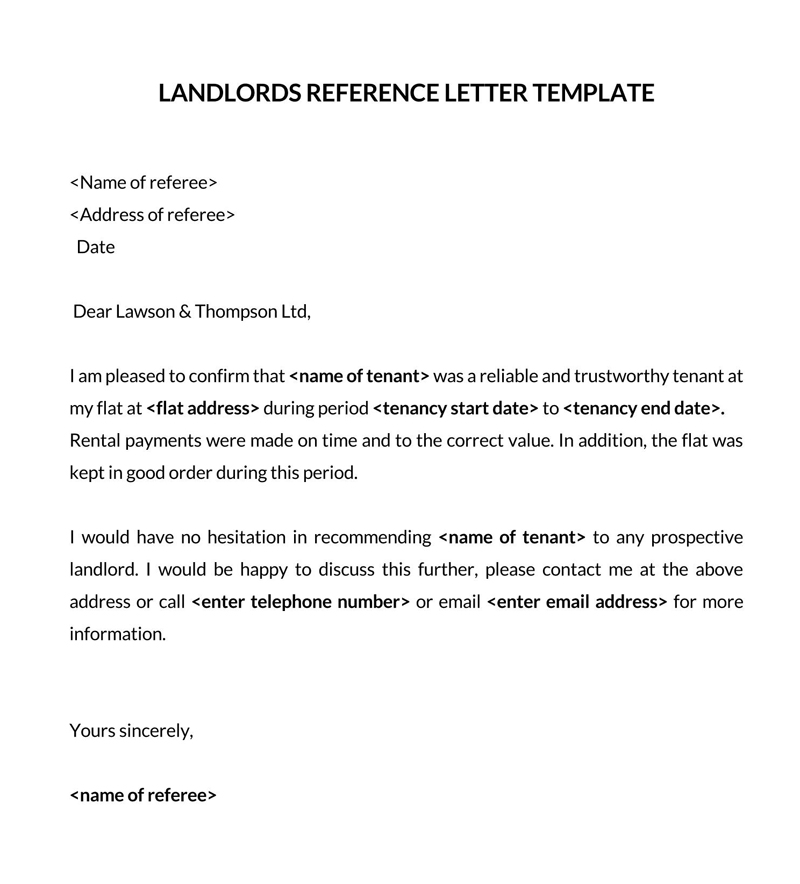
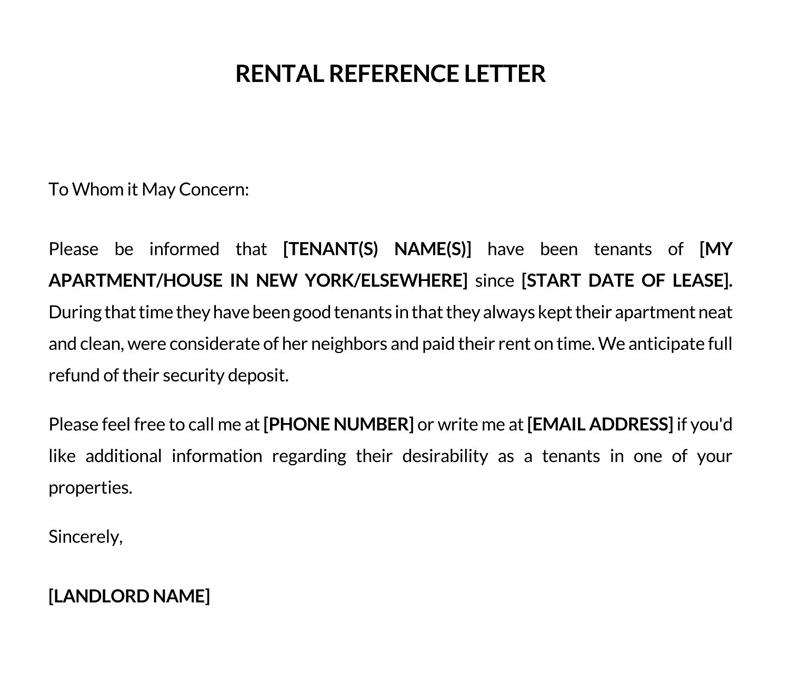
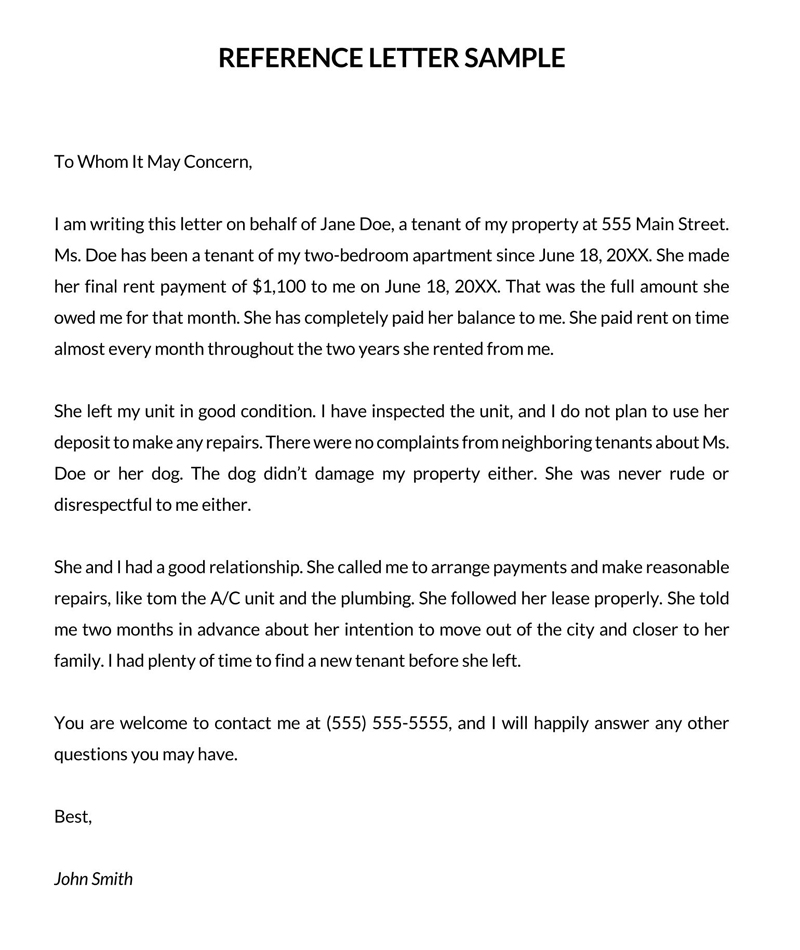
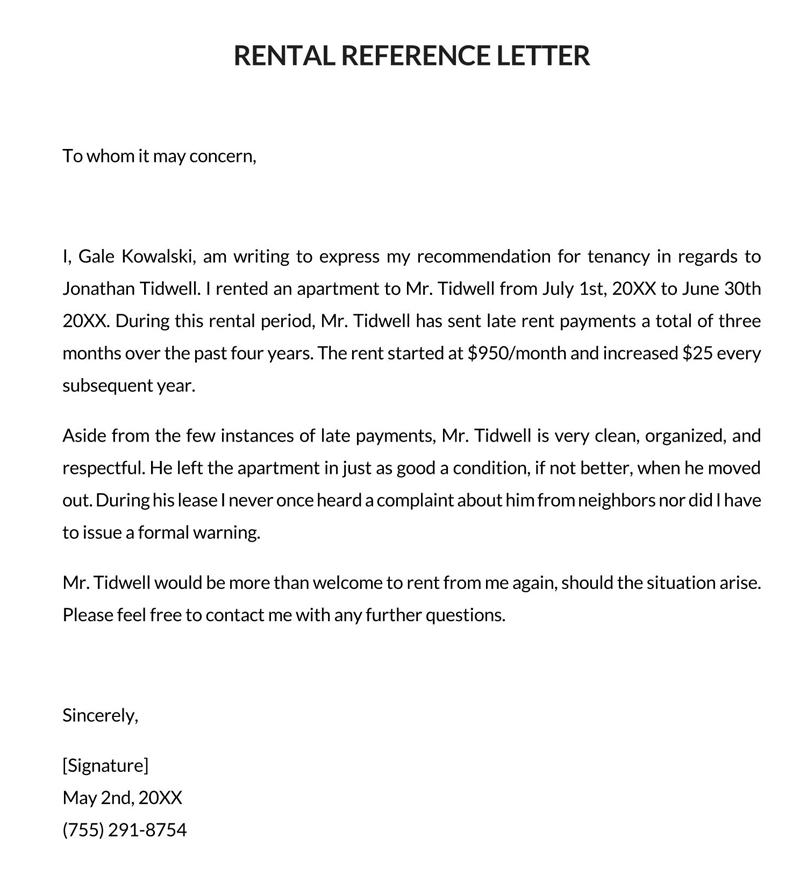
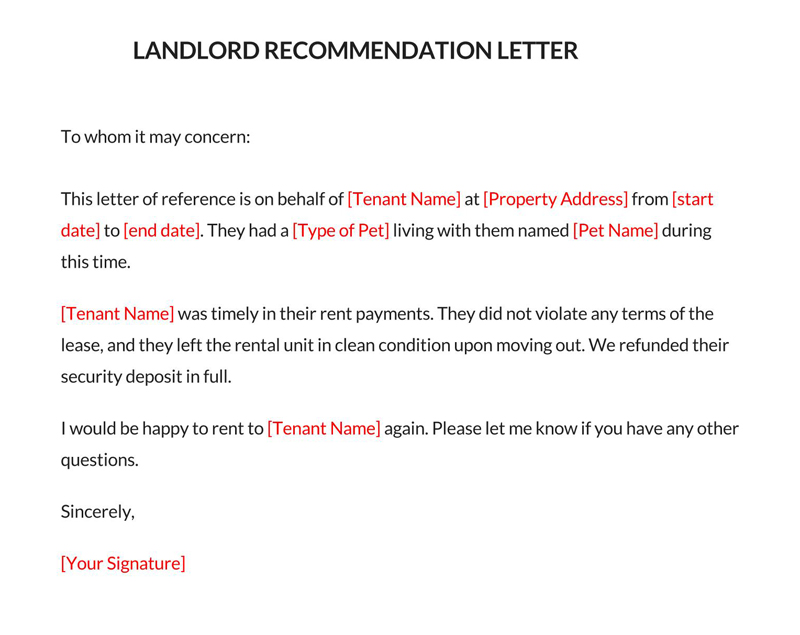
Who Can Act as a Recommender?
This type of letter is most appropriate for a landlord who has an extended rental history with a tenant. Writing a recommendation letter for a longtime tenant establishes a consistent and mutually respectful relationship that can be presented to the future landlord.
However, suppose the landlord has not had a very long history with the tenant. In that case, they should at least have a positive relationship with them to give the new landlord a reliable character reference. As landlords are typically seeking dependable and respectful tenants, a recommendation letter should come from someone who can realistically vouch for that tenant.
Importance of the Letter
As it is often difficult for tenants to locate either a residential or commercial property and then prove that they will be a reliable renters, landlords may choose to provide support by writing a letter of recommendation demonstrating their dependability.
In addition, a recommendation letter can provide insight into the potential lessee’s financial responsibility and personal character, something which can act as a crucial proof in both residential and commercial rental properties, as a recommendation letter can imply to the other landlord that they do not need to worry about anything unlawful occurring on their property.
What Should be Included In the Letter?
As the tenant recommendation letter has the goal of proving the reliability of a renter, then the content of the letter should include information that demonstrates those aspects. For example, if all the necessary information about the author of the letter is included, such as numerical data that can be proven through receipts, and qualitative information about the tenant’s level of responsibility, the end result is a letter that will demonstrate their reliability and actions as a renter.
The letter should include honest information written in professional but precise language. As a fellow lessor, the letter’s author should understand the writing should be simple, to the point, and provide all the necessary information.
To explain this idea further, here are more details about each of those subsections:
Header
An appropriate header is vital so that the recipient immediately understands the purpose of the document. Here is where you can include “Tenant Recommendation Letter” in bold, larger font to make sure the document’s purpose is understandable from a glance.
Name and address of the writer
After the heading, the author should write their name and address on the left to establish a professional contact with the potential reader. The writer can also include a phone number here at their will.
For example, they can write:
John Doe
121 Pennsylvania Ave.
New York, New York 12345
Date
To avoid any misunderstandings in relevancy, the author should include the full date when writing the letter like so:
January 1st, 2021
Tenant’s name
It is essential to write out the tenant’s full name when writing the letter. It should remain professional in style, so referring to the tenant as “Johnny” may not be appropriate, but instead, their entire name, like “John A. Smith,” is preferred. Their name should be within the first sentence of the introductory paragraph.
For example:
“I am writing this letter to confirm the responsibility of Ms. Samantha T. White…”
Introduction
The introduction should start with a formal greeting. If the author does not know the intended reader, a “to whom it may concern” may be appropriate. Otherwise, the reader’s name would be preferred. As mentioned, the tenant’s name should be immediately mentioned as well as other relevant technical information.
In other words, it should mention the previous landlord’s and tenant’s name, how long the rental contract was for, whether it was a residential or commercial contract, the amount of rent paid monthly, and any information regarding rental violations (or lack thereof). This section should be self-explanatory and technical.
For example:
“Ms. Samantha T. White stayed at the residential property on 36, 5th Ave for a total of 2 years, paying $850 monthly on the 1st of each month with zero rental violations.”
Body of the letter
The letter’s body paragraph(s) may be less technical but maintain a professional tone. It can be between 1-3 paragraphs, depending on how much information the author feels is appropriate to mention. It should highlight the excellent character of the tenant or expand upon any events relevant to tenant recommendations.
The body paragraphs may include anecdotes demonstrating their good nature or actions, which were seen as positive from a lessor’s point of view. For example, if the tenant frequently cleans communal space or cares about the rental space, this is the right place in the letter to include that type of information.
Finally, depending on whether the target landlord is for a residential or commercial space, different types of information may be appropriate. For example, the tenant’s character and community standing may be appropriate in residential properties, while responsible behavior and business attitude might be preferred for commercial spaces. For example:
“I am quite content with having Ms. Samantha T. White stay at the property for the whole rental period. She was always exceptionally neighborly to me and the others and was very respectful. The property always appeared to be clean and orderly, and upon the termination of the rental contract, it was in perfect condition.”
Conclusion
In conclusion, the author should express a willingness to be contacted if the reader has any other relevant questions. It should also include a sign-off statement that summarizes the nature of the recommendation letter. For example:
“I am more than happy to answer any and all questions regarding Ms. White’s dependability as a tenant. She was an ideal tenant, and any landlord should feel no apprehension in signing with her.
Kind regards,
John Doe”
Signature
Finally, the letter should have a formal sign-off and be physically or digitally signed by the author. It should also include the author’s contact information so that the reader may reach out if they have any more questions or concerns. For example:
“Kind regards,
John Doe
[signature]
Johndoe@gmail.com”
Tenant Recommendation Letter Template
Tenant Recommendation Letter
[Landlord name]
[Personal address,
City, State, Postal Code]
[Date]
To Whom It May Concern,
I, [Name] am writing to recommend [Tenant] as a responsible tenant. They have stayed at [Rental Location] for a total of [time] as per the lease agreement, paying [rent amount] each month on then [1st / 15th]. In this time, there were [number] contract violations on this [residential/commercial] lease.
I am very pleased with having [Tenant] stay at the property during these [rental time]. They were always very cordial and [personal descriptor].
The property was always clean and presentable, and I found no issues when the property was returned to me.
If you have any questions or concerns regarding [Tenant]’s responsibility as a renter, please do not hesitate to contact me.
Kind regards,
[Landlord’s name]
[Signature]
[email or phone number]
Sample Tenant Recommendation Letter
Tenant Recommendation Letter
John Doe
121 Pennsylvania Ave.
New York, New York 12345
January 1st, 2021
To whom it may concern,
I, John Doe, am writing this letter to confirm the responsibility of Ms. Samantha T. White as a tenant at 36, 5th avenue, in New York, NY. Ms. Samantha T. White stayed at the residential property on 36, 5th Ave for a total of 2 years, paying $850 monthly on the 1st of each month with zero rental violations.
I am quite content with her having stayed with us over these past two years. She has always been a delight to the rest of the neighbors in the community and very respectful regarding the community rules. I have never once received any complaints about her behavior.
She always delivered the rental payments on time and kept the property clean and orderly. Upon the termination of the contract, it was returned in perfect condition.
I am more than happy to answer any questions regarding Ms. White’s reliability as a tenant. Any future landlord should feel completely at ease having Ms. White stay at their property.
Kind regards,
John Doe
[signature]
Johndoe@gmail.com
Basic Do’s and Don’ts of It
When writing a tenant recommendation letter, several best practices should be followed and are generally advised in all situations. However, some key ideas should be avoided.
Do’s to keep in mind
Always remember that a tenant recommendation letter should be as professional as possible. The author should avoid any potential emotions that may alter the reader’s opinion of the tenant, for better or for worse.
To keep the letter appropriate, here are some strategies to follow:
Use of reliable information
Firstly, make sure only to use reliable information. The information should be relevant to the tenant-landlord relationship. In this sense, your letter should only list specific facts and data about the rental history. Of course, you can tell positive anecdotes about the lessee if they are relevant, but it’s better not to include redundant information that isn’t relevant.
Check for grammatical errors
As with all professional writing, it’s crucial to make sure you check for grammatical errors and typos before signing the letter. Tiny mistakes give off a feeling of a lack of professionalism and then defeat the purpose of this formal letter. In the case of using a template, make sure that you have entered the information correctly and that it all flows together well.
Be honest and brief
Writing a personal reference letter means that the author should be frank with the future landlord. At the same time, the writer should write accurate statements that cannot be misinterpreted or show the tenant negatively. This is best done by including brief, informative information. Avoiding fluffy statements helps prevent the reader from being overwhelmed and gives them a clear idea of the tenant.
Answer all questions
If the recipient wants to know something else about the tenant, it’s best to give honest answers rather than avoid the future landlord. Of course, the author may have a busy life, but they should be committed to answering a few quick follow-up questions that a fellow landlord may have by writing the recommendation letter.
Tip: A landlord does not have to write a letter if they do not want to. It is better to politely refuse to write a reference letter than to make false claims about the experience. Although no specific laws regulate these letters, it’s likely a better use of time to refuse than to write an adverse letter or lie.
Don’ts to avoid
The most important thing to know regarding tenant reference letters is that the author should never violate fair housing laws through discriminatory practices. For this reason, the writer should avoid specific mentions of the person’s race, ethnicity, gender, nationality, sexual orientation, family status, or any potential disabilities. Furthermore, even if the author means to express this information positively, it may violate the individual’s right to privacy, especially when the tenant belongs to a marginalized or protected community.
Apart from this crucial step, here are some other elements to avoid in the letter:
Writing when you’re not interested
If the author does not want to write the letter, they should not do so. If the landlord has a bad relationship with the tenant, they are in no way obliged to write the letter and can deny one.
Telling lies
It’s best to avoid giving any incorrect information for the good of all parties. The future landlord deserves to have an honest rental history, and it would be inappropriate to provide falsified information – whether that be positive or negative.
Delay in writing the letter
Finally, the tenant likely needs to locate housing arrangements as quickly as possible, so it is recommended to provide feedback promptly. Delays in writing the letter will only cause avoidable stress for all parties involved.
Conclusion
As a landlord, a tenant recommendation letter is an imminent responsibility that will arise at one point. While it’s acceptable to refuse to do so, it’s appropriate to take the time to do it in case of a positive rental history. These reference letters are exceptional ways for future landlords to get a feel for their potential tenants. Also, any landlord who is asked to write this letter should remember that they may one day be asking for a letter, so it’s good practice to take the time to write one.
Luckily, tenant recommendation letters are generally concise letters that do not require a lengthy time to produce. With samples, templates, and guides, any landlord will be able to draft an appropriate tenant recommendation letter in no time.












